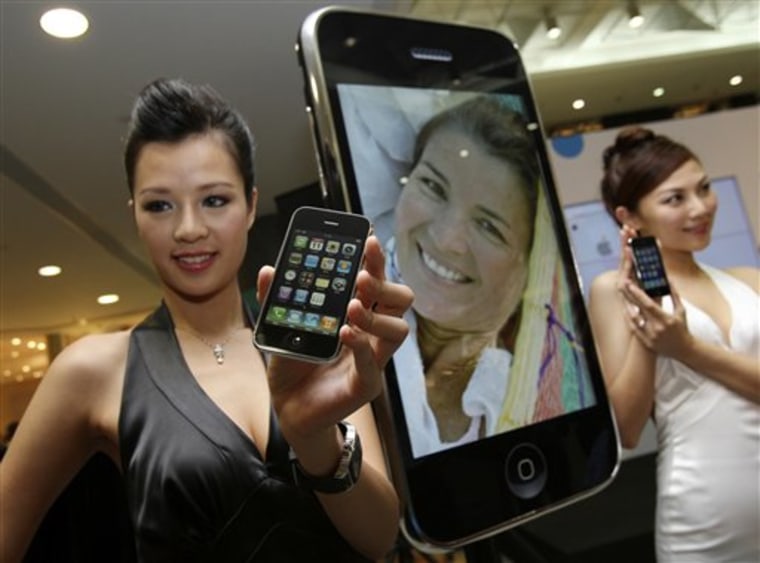In the Soviet days, Russians asked their American friends to bring blue jeans, rock records and other Western goods into the country. Today Russians can buy almost anything they want here — but they are still begging for one item: Apple Inc.'s slick iPhone.
The new iPhone went on sale in 21 countries July 11 and will soon be released in 70 nations. Officially, Russia and China are still on hold — neither last year's original iPhone nor the updated model have been launched in those countries because Apple is still negotiating with mobile service providers.
And yet analysts estimate that only the U.S. has more iPhone users than Russia and China.
In both countries, the device enjoys super-exclusive status, thanks to a thriving market for "unlocked" iPhones adapted for local use. Even Russian President Dmitry Medvedev has been seen using one.
Moscow and Beijing have become an iPhone trader's paradise. Russian Web sites were offering the new 3G iPhone for about $1,200, six times the $199 base price in the U.S. Even Apple's first-edition 8-gigabyte iPhone was going for almost as much at Moscow's Gorbushka electronics market this week, though Moscow iPhone owners said a skilled bargain hunter could find one for about $775.
"They are being brought in in suitcases," said Eldar Murtazin of Moscow's Mobile Research Group. "No one is paying any sort of customs fees."
Murtazin estimates that 400,000 iPhones have been brought into Russia since the first model was released in June 2007. China is believed to have at least twice as many.
Online auction sites in mainland China, such as taobao.com, were offering the new 16-gigabyte model the day of its release for $1,370. However, dealers at Beijing's Nurenjie shopping complex predicted it would go for about $735 once it arrived.
Russian and Chinese buyers aren't all paying astronomical prices for their iPhones. Some buy the phones for themselves when abroad, while others request them from friends traveling in the U.S. or Europe. The iPhone is also sold legally in Hong Kong.
They then pay a fee — around $100 in Russia — to get it "unlocked" for local use on the Russian or Chinese network of their choice.
Once unlocked, the flashy gadget is good to go — although the new iPhones can't max out on their Internet connectivity in many cities in Russia and mainland China because of the absence of so-called "3G" high-speed networks.
"I knew I wanted to buy it right when it came out, but I didn't have an opportunity to," said Moscow resident Ruslan Kashapov, 28, who eventually bought a first-edition iPhone for $399 in April, courtesy of a friend who brought it back from the United States. He said he would buy the new iPhone if he could get it at U.S. prices.
But with the new iPhone, Russian and Chinese enthusiasts face an additional hurdle.
In the past, customers could buy an iPhone in the U.S. without activating it on a service plan, and analysts estimated that one-third to one-half of the phones sold in the U.S. never made it onto AT&T Inc.'s network.
The new iPhone, however, is subsidized by mobile carriers. This accounts for the drop in price from $399 to $199 for the base model, but it also means that buyers will be forced to activate service contracts before leaving the store.
Zhu Shuang, 27, who works at an Internet search engine in Shanghai, said she paid $399 for a first-edition iPhone, which she received from a friend returning from the U.S. and had unlocked in China — where the devices are made, incidentally.
"At that time, you could buy the phone without signing a contract," she said. Zhu said she wants to buy the new iPhone, but the new regulations are "troublesome." She has yet to decide if she will purchase a smuggled phone or buy one outside of China with a contract.
Apple did not comment on the use of its phones in places like Russia and China, although CEO Steve Jobs has said the company expects to sign contracts with Russian and Chinese providers this year.
